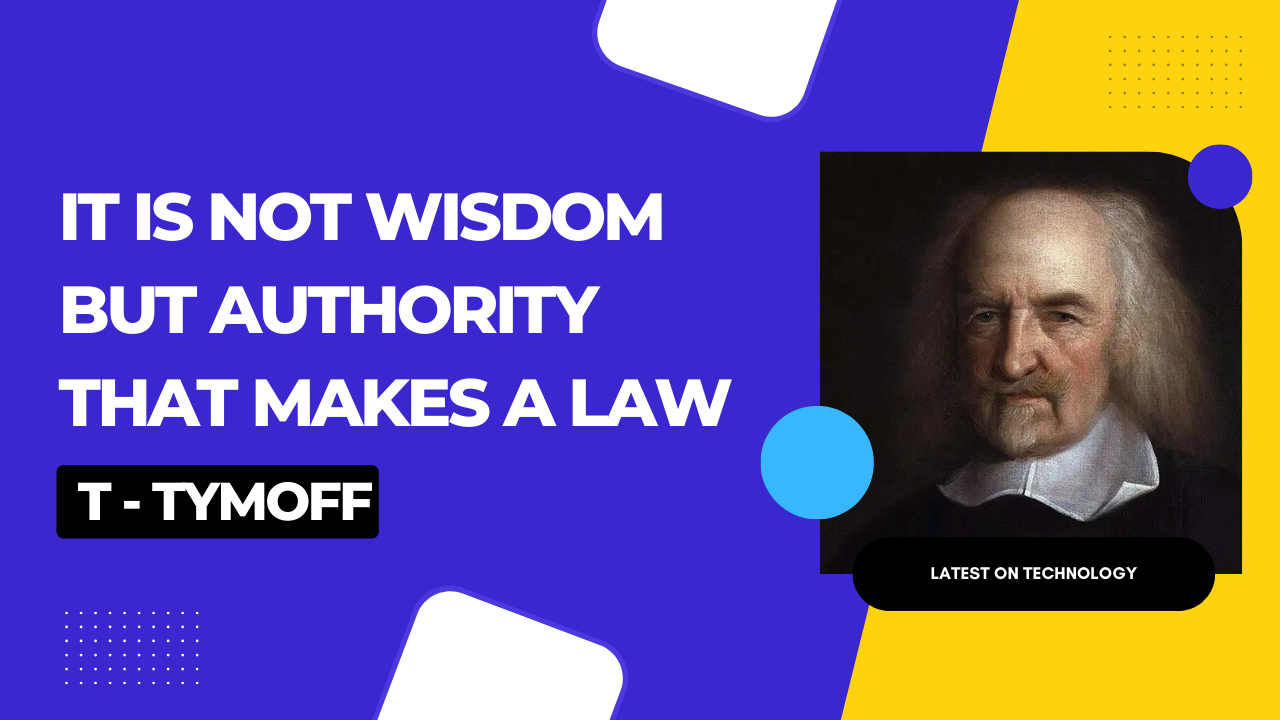It is not wisdom but authority that makes a law. t – tymoff
- 1 What does the statement “It is not wisdom but authority that makes a law. t – tymoff” explain?
- 2 FAQs
- 2.1 What does Thomas Hobbes’s statement on Wisdom & authority refer to in real life?
- 2.2 How does Hobbes’ interpretation of law and authority differ from the natural law tradition?
- 2.3 How should a balance be struck between wisdom and authority in legislation making?
- 2.4 How is authority related to the theory of legitimacy in government according to Hobbes?
- 2.5 Why does Hobbes’s perception of law and authority conform to the notion of civil disobedience?
‘It is not wisdom but authority that makes a law. t-tymoff,’ said Thomas Hobbes once, and the quote has been a center of debate ever since his statement. Thomas Hobbes gave one of the smartest statements that very well elaborates on the functioning of society. He spoke about this quote in his 1651 work, Leviathan.
Concerning it, the statement by Hobbes suggests that such a society is much more comfortable with the hand of power rather than the mind. That said, he doesn’t look down upon intellect as he states that society is a mirror of power and not intellect, wisdom, or reason. He maintained that it is through the law and not out of it. Therefore, if made by the sovereign, a law is regarded as right even though it has no relationship with reasonableness and fairness. Such a thought is not in conformity with the natural law tradition that suggests that all laws are grounded in the foundations of justice and reason.
There have also been scholars who have supported and disagreed with Hobbes’s proclamation that “It is not wisdom but authority that makes a law.” Based on their critique of him, it is seen that they viewed his emphasis on authority as warping the definition of justice into arbitrary lawmaking. They claim that reason and morality, rather than a ruler’s will, must underlie laws. On the other hand, Hobbes’s supporters argue that it is necessary to have a strong sovereign to ensure social order. This is due to the reason that they argue that without a real leader, society could not stand up and any laws would be meaningless. The controversy regarding Hobbes’s ideas about authority and the law continues to date. His theory has revolutionized political philosophy as we know it now by enlightening us on complex interplays among the state, the ruling class, and the society at large.
What does the statement “It is not wisdom but authority that makes a law. t – tymoff” explain?
Hobbes’s remark underscores the importance of equilibrium regarding wisdom and power in the domain of legislation. Authority provides for enforcement of laws and restoration of order but wisdom ensures that laws are just and effective as well as concurrence with society’s expectations. To illustrate this balance, consider the following scenario: A society makes a law that forbids littering in public places. This law emanates from the wisdom of acknowledging the adverse environmental and beautification impacts linked with littering.
Nevertheless, since this law cannot be enforced, people may still litter for instance without any form of punishment being administered making this law meaningless.
However, a society that enforces a rule requiring daily exercise will never be wise. Such a rule is against autonomous wisdom and informed decisions on healthy living. The absence of balance between power and enlightenment could cause displeasure and rebelliousness.
Let’s understand the difference between Authority and wisdom
To understand Thomas Hobbes ‘It is not wisdom but authority that makes a law.t-tymoff’ it is important to understand the difference between being wise and having authority is evident in the statement “It is not wisdom but authority that makes the law”, made by Thomas Hobbes. A wise person or society has wisdom which encompasses knowledge, comprehension, and good judgment. Wisdom leads a wise man or society to make better decisions or actions. Hobbes accepted, however, the fact that pure wisdom would not be enough to implement or enforce the existing laws.
However, authority refers to the ability to give orders and to ensure compliance with them. It is what obliges people to respect the law, no matter how irrational its reasons are. Laws in a well-structured society would not be mere suggestions but an obligation that must be obeyed by all.
A clear distinction between authority and wisdom is essential for comprehension of the place of law in a well-structured society. Though important in the drafting of good and fair laws, wisdom cannot force them to be implemented. Whereas authority can enforce laws, it is not always wise, and therefore laws could be unfair or irrelevant.
It is important to realize the difference between wisdom and authority while explaining how law preserves social harmony. Though it is critical to creating good and fair laws, wisdom does not have the means of enforcement. Power can enforce the law but may not necessarily accord with the wisdom and if it so it’d be making an unfair as well as useless rule.
For quite some time, society has always admired barristers and has emphasized education and the ‘wise’ folks. However, their real inclination has always been towards power. As a human, we naturally incline more towards confidence than knowledge. This is why even in high schools we find the analogy of the Geeks being bullied or made fun of, and the jocks or the popular students have the most charming impression, irrespective of their intelligence. Society seeks approval from the popular people as they have more authority, more confidence, an enigma, and an aura of power with them. Humans either bow down or engage in conflict with such people.
And the ones who have a high intellect are left to be alone, even though they probably understand and know more than the person in authority, these intelligent folks (sometimes))willingly, sometimes unwillingly have to take a step back and just let society do what it is doing. And these people are the ones who build constitutions and map out the entire idea of a project. These are the brains without faces, and yet they don’t need approval.
FAQs
What does Thomas Hobbes’s statement on Wisdom & authority refer to in real life?
While speaking on Authority and wisdom, Hobbes emphasized wisdom as an essential element, while authority provided the practical requirement for the law-making process. Wisdom leads individuals and society to make good choices and do good things.
How does Hobbes’ interpretation of law and authority differ from the natural law tradition?
According to the natural law tradition, since man is born with those innate rights, a law derived from it should be based on universal reasoning and natural justice. However, Hobbes disagreed that the law is always based on reason and morality but rather that order comes from a sovereign power. He argued that, for valid laws, it is not what is within them but where they come from.
How should a balance be struck between wisdom and authority in legislation making?
An equilibrium in law-making calls for considering wisdom and authority carefully. However, seeking opinions from experts and involving stakeholders is vital to ascertain whether the rational judgments would be based on knowledge and not emotions. That is, in the absence of a strong government system, no laws can be implemented at all to stabilize society.
How is authority related to the theory of legitimacy in government according to Hobbes?
Hobbes believed in voluntary consented governance. Consent is given by people to the sovereign’s power, and as such they agree to abide by the law set forth by the sovereign. This consent is vital for social order rather than being in a state of war of all against all (Hobbes, 2). This therefore implies that a legitimate government must get approval from those whom they are supposed to rule on.
Why does Hobbes’s perception of law and authority conform to the notion of civil disobedience?
Civil disobedience, in turn, means ignoring and resisting the law as a nonviolent protest. Because of the above discussion, Hobbes’s perception that authority creates law indicates that civil disobedience is innately illegitimate because it weakens the command power of the supreme ruler/sovereignty. Some advocates of civil disobedience are of the view that it is an essential and legitimate way of combating ill-conceived laws and initiating social reforms.

















